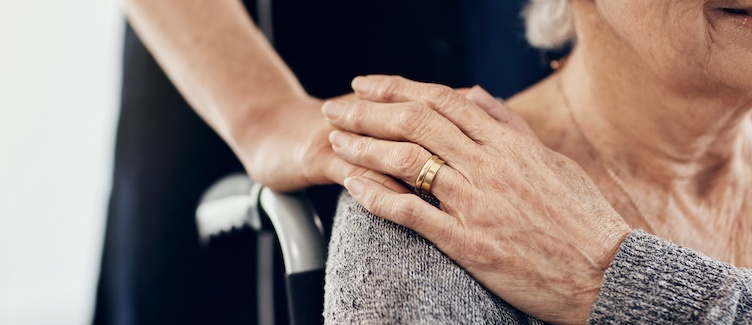If you’re providing at-home care for an ailing loved one, you’re not alone. More than 50 million unpaid caregivers are helping another adult who has health challenges or other functional needs. That’s according to Caregiving in the U.S. 2020, a National Alliance for Caregiving/AARP survey.
According to the report, family caregivers across the United States are dealing with a wide range of health issues, including:
- Long-term physical ailments (63%)
- Memory problems (32%, with 26% reporting Alzheimer’s or dementia)
- Emotional or mental health issues (27%)
The specific kind of care your loved one needs depends on their physical and mental health. Here are some common caregiving tasks you may need to take on — along with some tips on how best to help.
Assisting With Daily Living
Almost all caregivers (99%) assist family members with the activities of daily living such as housekeeping, preparing meals, managing medicines, and shopping. This kind of care also may include help with bathing, using the toilet, getting dressed, walking, getting up from a chair or bed, and eating.
While these tasks may not be particularly complex, providing them day in and day out can be demanding — and sometimes draining. It’s okay to ask for help.
To lighten your load, reach out to other family members or friends to do an occasional errand or task. If possible, ask someone you trust to spend a few hours with your loved one so you can take a break.
If need be, consider getting part-time help from a home care service.
Never Miss a Beat!
Subscribe to Our HealthBeat Newsletter!
Thank you for subscribing!
You can now select the specific newsletters you'd like to receive.
You are already subscribed.
Subscribe to more newsletters in our email preference center.
Sorry, an error occurred. Please try again later.
Get Healthy Tips Sent to Your Phone!
Getting to Medical Appointments
Caregivers are often responsible for transporting a family member to the doctor or other medical appointments. But your assistance can go beyond providing a ride.
Ask your loved one if you can sit in when they talk to the doctor. It can be a great opportunity to gather information that will help you be a more effective caregiver.
For instance, you can ask the doctor for more clarity on your loved one’s medical condition — and how it will affect ongoing care needs. You can request detailed instructions for taking a prescribed medicine or other ways you can provide support. And you can encourage your family member to ask questions or share information.
Performing Medical and Nursing Tasks
More than half of caregivers are performing at least some medical or nursing tasks, according to the report. Those duties can include giving injections, cleaning and dressing wounds, and managing incontinence (lack of bowel and bladder control).
In these situations, you may receive some instruction or training from the health care professionals involved in your family member’s care. If you have questions, be sure to ask for more information.
If you don’t feel able to carry out certain tasks yourself, ask if it’s possible to arrange for a visiting nurse. A visiting nurse can come into the home to handle more complex tasks like cleaning and dressing wounds or giving intravenous fluids.
Assisting With Mobility Challenges
If your family member is having trouble getting up and down or moving around, they may need a mobility aid such as a cane, walker, or wheelchair. You may need to encourage them to use these aids — and show how to use them correctly.
Falls are the number one mobility problem that older people face. Each year, 30 million older adults experience a fall, according to the Centers for Disease Control and Prevention.
You can help prevent falls by making your loved one’s living space safer. Be sure the space has good lighting. Avoid area and throw rugs, especially in bathrooms and kitchens. Install grab bars in the bathroom, and railings on both sides of stairways.
Managing Medical Care
One of your biggest roles will be coordinating the care your loved one receives from doctors and other professional care providers. You also may be the designated family contact person for that health care team.
Find out if your family member must sign a release form before their doctors and health facilities will share information with you. Once you’re in the loop, keep a notebook of all doctors’ comments and instructions, and test results, plus questions you have. Take that medical diary with you to each appointment.
Managing an aging family member’s health care can be overwhelming. Before the stress becomes too much, consider consulting with a geriatrician. A geriatrician is a doctor who specializes in treating older people with multiple medical conditions.
A geriatrician can help tailor a holistic health care plan that best meets your loved one’s goals. They can also ease your burden by taking on the responsibility of coordinating your loved one’s health care plan.
To connect with a geriatrician for assistance with your family member’s health care needs, call the UPMC Senior Care-Benedum Geriatric Center at 412-692-4200 or the UPMC Senior Care Institute at 412-623-2700.
Sources
About Geriatrics
UPMC geriatric medicine seeks to enhance the lives of older adults through clinical care and research. We are nationally recognized for our expertise; our multidisciplinary team specializes in care for seniors. We diagnose and treat a wide variety of conditions affecting seniors, including medical, physical, cognitive, psychological, and social. Our hope is to provide the best care in people’s later years. We can help on an inpatient or outpatient basis, for short-term or long-term conditions.
